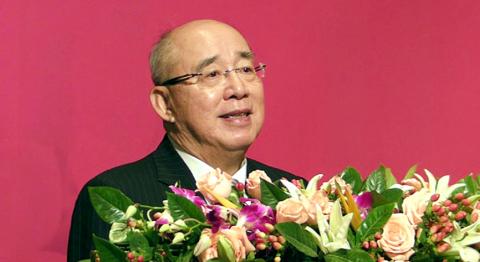Former Chinese Nationalist Party (KMT) chairman Wu Poh--hsiung (吳伯雄) said yesterday that the KMT was optimistic about the Democratic Progressive Party’s (DPP) plan to restore its Department of China Affairs to handle cross-strait issues.
The KMT expected cross-strait economic exchanges to deepen, while acknowledging the differences between the two sides, he added.
“We are delighted to see that some political parties have decided to change their approach and start a dialogue with mainland China ... More communication between Taiwan and the mainland can only help to reduce differences within Taiwan and achieve consensus, so the KMT welcomes such developments,” Wu said.

Photo: CNA
He was referring to the DPP’s plan to reinstate its Department of China Affairs, which was part of the campaign platform of DPP Chairman Su Tseng-chang (蘇貞昌), who was elected in May, and has pledged to improve the party’s understanding of and interaction with China.
Wu made the remarks yesterday when speaking at the opening ceremony of the annual forum between the KMT and Chinese Communist Party (CCP) in Harbin, China.
The two-day forum opened yesterday. Wu and a delegation of more than 200 KMT officials and representatives from other political parties, industry and academia attended the annual cross-strait economic, trade and cultural forum.
Wu said that since the forum was first held in 2005, it has attracted participants from a wider range of political backgrounds and KMT members now accounted for about one-third of all representatives at the forum.
Wu also reiterated the consensus the two sides reached during his meeting with Chinese President Hu Jintao (胡錦濤) in March that the two sides should work to consolidate mutual trust, deepen economic and trade cooperation on the basis of the “1992 consensus” and opposition to Taiwanese independence.
The “1992 consensus” and “one China” principle have provided a long-term foundation for exchanges between the two sides, Wu said, acknowledging that Taiwan and China shared different views as to the nature of the “one China” principle, with President Ma Ying-jeou’s (馬英九) administration holding that “one China” referred to the Republic of China (ROC).
“We should continue to abide by the principles of putting aside differences and seeking consensus, and put economics before politics in handling cross-strait relations. This is why we are focused on cross-strait exchanges in the area of economic and trade cooperation,” Wu said.
However, Chinese People’s Consultative Conference Chairman Jia Qinglin (賈慶林), who represented the CCP at the forum, said that China and Taiwan belonged to one nation, that he expected the two sides to promote cross-strait relations under the “one China” mechanism, and that negotiations on the Economic Cooperation Framework Agreement (ECFA) should be speeded up and push forward on cross-strait economic cooperation.
While stressing the “one China” principle, Wu did not touch on comments he made during a meeting with Hu in March, when he said that cross-strait matters should be handled under the banner of “one country, two areas” (一國兩區).
Wu said he expected the two sides to sign cross-strait investment protection deals at upcoming cross-strait talks and that Taiwan’s Straits Exchange Foundation and China‘s Association for Relations Across the Taiwan Straits (ARATS) would establish offices in Beijing and Taipei, respectively.
Cross-strait talks will be held on Aug. 9 at the Taipei Grand Hotel. ARATS Chairman Chen Yunlin (陳雲林) is expected to arrive in Taipei for the talks on Aug. 8. A cross-strait investment protection agreement will be one of the major issues addressed by the meeting.

The Ministry of Foreign Affairs (MOFA) yesterday voiced dissatisfaction with the Comprehensive and Progressive Agreement for Trans- Pacific Partnership (CPTPP), whose latest meeting, concluded earlier the same day, appeared not to address the country’s application. In a statement, MOFA said the CPTPP commission had "once again failed to fairly process Taiwan’s application," attributing the inaction to the bloc’s "succumbing to political pressure," without elaborating. Taiwan submitted its CPTPP application under the name "Separate Customs Territory of Taiwan, Penghu, Kinmen and Matsu" on Sept. 22, 2021 -- less than a week after China

ALIGNED THINKING: Taiwan and Japan have a mutual interest in trade, culture and engineering, and can work together for stability, Cho Jung-tai said Taiwan and Japan are two like-minded countries willing to work together to form a “safety barrier” in the Indo-Pacific region, Premier Cho Jung-tai (卓榮泰) yesterday said at the opening ceremony of the 35th Taiwan-Japan Modern Engineering and Technology Symposium in Taipei. Taiwan and Japan are close geographically and closer emotionally, he added. Citing the overflowing of a barrier lake in the Mataian River (馬太鞍溪) in September, Cho said the submersible water level sensors given by Japan during the disaster helped Taiwan monitor the lake’s water levels more accurately. Japan also provided a lot of vaccines early in the outbreak of the COVID-19 pandemic,

Kaohsiung Mayor Chen Chi-mai (陳其邁) on Monday announced light shows and themed traffic lights to welcome fans of South Korean pop group Twice to the port city. The group is to play Kaohsiung on Saturday as part of its “This Is For” world tour. It would be the group’s first performance in Taiwan since its debut 10 years ago. The all-female group consists of five South Koreans, three Japanese and Tainan’s Chou Tzu-yu (周子瑜), the first Taiwan-born and raised member of a South Korean girl group. To promote the group’s arrival, the city has been holding a series of events, including a pop-up

A home-style restaurant opened by a Taiwanese woman in Quezon City in Metro Manila has been featured in the first-ever Michelin Guide honoring exceptional restaurants in the Philippines. The restaurant, Fong Wei Wu (豐味屋), was one of 74 eateries to receive a “Michelin Selected” honor in the guide, while one restaurant received two Michelin stars, eight received one star and 25 were awarded a “Bib Gourmand.” The guide, which was limited to restaurants in Metro Manila and Cebu, was published on Oct. 30. In an interview, Feng Wei Wu’s owner and chef, Linda, said that as a restaurateur in her 60s, receiving an